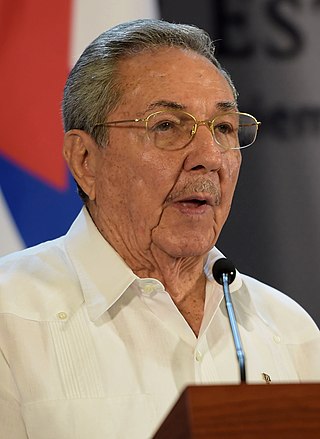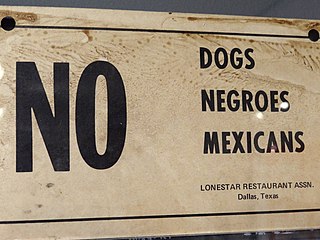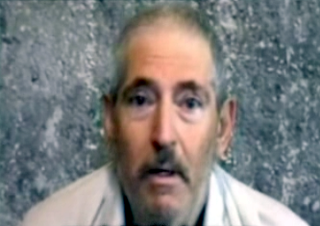Related Research Articles

Abu Sayyaf, officially known by the Islamic State as the Islamic State – East Asia Province, was a Jihadist militant and pirate group that followed the Wahhabi doctrine of Sunni Islam. It was based in and around Jolo and Basilan islands in the southwestern part of the Philippines, where for more than five decades, Moro groups had been engaged in an insurgency seeking to make Moro Province independent. The group was considered violent and was responsible for the Philippines' worst terrorist attack, the bombing of MV Superferry 14 in 2004, which killed 116 people. The name of the group was derived from Arabic abu, and sayyaf. As of April 2023, the group was estimated to have about 20 members, down from 1,250 in 2000. They used mostly improvised explosive devices, mortars and automatic rifles.

The Revolutionary Armed Forces of Colombia – People's Army is a Marxist–Leninist guerrilla group involved in the continuing Colombian conflict starting in 1964. The FARC-EP was officially founded in 1966 from peasant self-defense groups formed from 1948 during the "Violencia" as a peasant force promoting a political line of agrarianism and anti-imperialism. They are known to employ a variety of military tactics, in addition to more unconventional methods, including terrorism.

Fulgencio Batista y Zaldívar was a Cuban military officer and politician who played a dominant role in Cuban politics from his initial rise to power as part of the 1933 Revolt of the Sergeants until his overthrow in the Cuban Revolution in 1959. He served as elected president of Cuba from 1940 to 1944, and military dictator from 1952 to his 1959 resignation.

Stockholm syndrome is a proposed condition or theory that tries to explain why hostages sometimes develop a psychological bond with their captors.

Raúl Modesto Castro Ruz is a Cuban retired politician and general who served as the first secretary of the Communist Party of Cuba, the most senior position in the one-party communist state, from 2011 to 2021, and President of Cuba between 2008 and 2018, succeeding his brother Fidel Castro.

The Tijuana Cartel, formerly also known as the Arellano-Félix Cartel, is a Mexican drug cartel based in Tijuana, Baja California, Mexico. Founded by the Arellano-Félix family, the cartel once was described as "one of the biggest and most violent criminal groups in Mexico". However, since the 2006 Sinaloa Cartel incursion into Baja California and the fall of the Arellano-Félix brothers, the Tijuana Cartel has been reduced to a few cells. In 2016, the organization became known as Cartel Tijuana Nueva Generación and began to align itself under the Jalisco New Generation Cartel, along with the Beltrán Leyva Organization (BLO) to create an anti-Sinaloa alliance, which the Jalisco New Generation Cartel heads. This alliance has since dwindled as the Tijuana, Jalisco New Generation, and Sinaloa cartels all now battle each other for trafficking influence in the city of Tijuana and the region of Baja California.

An enforced disappearance is the secret abduction or imprisonment of a person with the support or acquiescence of a state followed by a refusal to acknowledge the person's fate or whereabouts with the intent of placing the victim outside the protection of the law. Often, forced disappearance implies murder whereby a victim is abducted, may be illegally detained, and is often tortured during interrogation, ultimately killed, and the body disposed of secretly. The party committing the murder has plausible deniability as there is no evidence of the victim's death.

The National Liberation Army is a Marxist–Leninist guerrilla insurgency group involved in the continuing Colombian conflict, which has existed in Colombia since 1964. The ELN advocates a composite communist ideology of Marxism-Leninism and liberation theology. In 2013, it was estimated that the ELN forces consisted of between 1,380 and 3,000 guerrillas. According to former ELN national directorate member Felipe Torres, one fifth of ELN supporters have taken up arms. The ELN has been classified as a terrorist organization by the governments of Colombia, the United States, Canada, New Zealand, and the European Union.

The Gulf Cartel is a criminal syndicate and drug trafficking organization in Mexico, and perhaps one of the oldest organized crime groups in the country. It is currently based in Matamoros, Tamaulipas, directly across the U.S. border from Brownsville, Texas.

Anti-Mexican sentiment is prejudice, fear, discrimination, xenophobia, racism, or hatred towards Mexico, its people, and their culture. It is most commonly seen in the United States.

Robert Alan "Bob" Levinson was an American former Drug Enforcement Administration (1970–1976) and Federal Bureau of Investigation (1976–1998) agent who disappeared on March 9, 2007, in Kish Island, Iran, while on a mission for the Central Intelligence Agency (1998–2007). Levinson's family received a $2.5 million annuity from the CIA in order to stop a lawsuit revealing details of his work in Iran and to forestall any revelation of details regarding the arrangement between Levinson and the agency.

David Parker Ray, also known as the Toy-Box Killer, was an American kidnapper, torturer, serial rapist and suspected serial killer. Ray kidnapped, raped, and tortured an unknown number of women over many decades at his home in Elephant Butte, New Mexico, occasionally assisted by accomplices including his daughter Glenda Jean Ray and partner Cindy Hendy. Ray was suspected by authorities and accused by accomplices of murdering up to 60 of his victims; however, no bodies or definitive evidence have ever been uncovered linking him to any murders.
The timeline of some of the most relevant events in the Mexican drug war is set out below. Although violence between drug cartels had been occurring for three decades, the Mexican government held a generally passive stance regarding cartel violence through the 1980s and early 2000s.

Muntadhar al-Zaidi is an Iraqi broadcast journalist who served as a correspondent for Iraqi-owned, Egyptian-based Al-Baghdadia TV. As of February 2011, al-Zaidi works with a Lebanese TV channel.
Armando Torres III is a U.S. marine in the Individual Ready Reserve who was reportedly kidnapped by gunmen near the U.S.-Mexico border in the Mexican state of Tamaulipas.
Kidnapping is a crime in the United States. Throughout its history, a number of incidents have taken place.

On 9 July 2011, affiliates of the Gulf Cartel kidnapped 18 members of the Cázares family from three different households in Matamoros, Tamaulipas, Mexico. The women and children were released three days later, but the abductors kept five men. Forty-eight hours later, the Gulf Cartel contacted the family members who had been released to negotiate a ransom. After several days of negotiation and several ransom payments totaling US$100,000, the Cázares were called to deliver their final payment on 27 July. They sent the money to the kidnappers and waited at a specified location for a white van the kidnappers promised would deliver their remaining family members. However, the van never arrived and the phone the kidnappers used to contact the Cázares went out of service. The family then decided to contact the authorities for a criminal investigation.

Jorge Luis Mendoza Cárdenas, commonly referred to by his alias La Garra, is a Mexican suspected drug lord and high-ranking leader of the Jalisco New Generation Cartel (CJNG), a criminal group based in Jalisco. Security forces suspect that La Garra heads the drug trafficking operations for the CJNG in the United States under Nemesio Oseguera Cervantes, the top leader of the criminal group. La Garra reportedly coordinates marijuana, cocaine, heroin, and methamphetamine shipments to Los Angeles, San Jose, Atlanta, and New York City from Mexico.

On January 15, 2001, 18-year-old Bridget Fay Townsend, the girlfriend of a local drug dealer, disappeared from her boyfriend's home in Bandera County, San Antonio, Texas.
References
- ↑ Julieta, Martínez (21 February 2008). "Destaca México en número de secuestros" (in Spanish). El Universal . Retrieved 15 December 2008.
- 1 2 3 Stevenson, Mark (2008-12-15). "US anti-kidnapping expert kidnapped in Mexico". Yahoo!. Archived from the original on 16 December 2008. Retrieved 2008-12-15.
- ↑ "Kidnappings soar in Mexico". AZ Central. 23 April 2008. Retrieved 15 December 2008.
- ↑ Lacey, Marc (16 December 2008). "Anti-kidnapping consultant kidnapped in Mexico". The New York Times.
- ↑ "Felix Batista". FBI . Retrieved 4 September 2017.
- ↑ Nolan, Caitlin (8 December 2016). "Family Still Searching for Answers, 8 Years After Anti-Kidnapping Expert Was Kidnapped". Inside Edition. Retrieved 6 April 2024.
- ↑ "'Please have mercy,' wife begs kidnappers - CNN.com". CNN. 7 January 2009. Retrieved 2 May 2010.